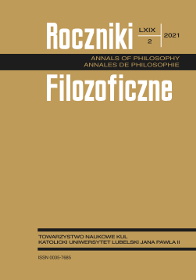Body–Soul and the Birth and Death of Man: Benedict Hesse’s Opinion in the Mediaeval Discussion
Abstract
This issue was discussed with regard to chosen commentaries to Aristotle’s treatise De anima, formed in the so-called via moderna mainstream, in particular those of John Buridan, Nicole Oresme and Laurentius of Lindores. In such a context, the Cracovian commentaries referring to Parisian nominalists were presented by those of Benedict Hesse and Anonymus. The analyses carried out above allow one to ascertain that although William of Ockham’s opinion questioning the possibility of knowledge of the soul in the field of philosophy, nominalists of the late Middle Ages did not resign from speculation on the beginning (birth) and the separation (death) from the body of the soul, also the fate of the soul after death. They focused on the nature of the matter – human body (embryo, semen) and his relation with the soul (forma) – in the moment of birth. In the aspect of death 14th century scholars undertook the struggle, which was one with the justification of the psycho-physical unity of the human being existing after death solely as an immortal soul.
In both thems, they tried to find their solutions, while if they could not solve these aporeticals questions – they had the courage to admit, that is not possible by solely relying on the natural forces of reason. They had to refer to the teaching of christianity, without however falling prey to fideism. This was a methodical endeavour based on the experience that natural reason in searching for the truth is not capable of its own efforts to attain to certain concepts and might on occasion err, it is then that faith becomes its guide and supplies it with more acceptable solutions. This is the courage of one of the greatest philosophers – Plato, who said that you have to have this “great courage” to undertake only probable knowledge, when another is not possible.
References
Amerini, Fabrizio. 2013. Aquinas on the Beginning and End of Human Life. Translated by Mark Henninger. Harvard: Harvard University Press.
Bajor, Wanda. 2016. “The concept of anima separata in terms of the late-mediaeval via moderna.” Studia Antyczne i Mediewistyczne 14 [49]: 113–127.
Bieniak, Magdalena. 2010. The Soul-Body Problem at Paris. CA. 1200–1250. Hugh of St - Cher and His Contemporares. Leuven: University Press.
Burrichter, Brigitte, and Thomas Dewender. 1988. “Die Diskussion der Frage nach der Unsterblichkeit in den «Quaestiones in libros De anima» des Benedikt Hesse von Krakau. In Die Philosophie im 14. und 15. Jahrhundert. In memoriam Konstanty Michalski (1879–1947). Bochumer Studien zur Philosophie 10: 573–602.
Courtenay, William J. 2008. Ockham and Ockhamism. Studies in the Dissemination and Impact of His Tought, Studien und Texte zur Geistesgeschichte des Mittelalters, 99. Leiden, Boston: Brill.
Craemer-Ruegenberg, Ingrid. 2005. “Albertus Magnus.” In Dominikanische Quellen und Zeugnisse, 7, edited by Henryk Anzulewicz. Lepzig: St. Benno-Verlag GmbH.
da Cruz Pontes, José Maria. 1964. “Le problème de l’âme de la patristique à la solution thomiste.” Recherches de théologie ancienne et médiévale 31 (Juillet-Décembre): 175–229.
de Boer, Sander W. 2013. The Science of the Soul: The Commentary Tradition on Aristotle’s De Anima c. 1260- c. 1360. Leuven: Leuven University Press.
Forest, Aimé. 1956. “La structure métaphysique du concret selon Saint Thomas d’Aquin.” In Études de Philosophie Médiévale XIV, edited by Étienne Gilson. Paris: Librairie Philosophique J. Vrin.
King, Peter. 2017. “Later Medieval Philosophy of Cognitive Psychology.” In Questions on the Soul by John Buridan and Others. A Companion to John Buridan Philosophy of Mind, edited by Guyla Klima. Historical-Analytical Studies on Nature, Mind and Action 3: 1–19.
Kuksewicz, Zdzisław. 1975. Filozofia człowieka. Teoria duszy. Dzieje filozofii średniowiecznej w Polsce, t. 5. Warszawa: Wydawnictwo Polskiej Akademii Nauk.
Markowski, Mieczysław. 1988. “Der Buridanismus an der Krakauer Universität im Mittelalter.” In Die Philosophie im 14. und 15. Jahrhundert. In memoriam Konstanty Michalski (1879–1947). Bochumer Studien zur Philosophie 10: 245–260.
Michalski, Konstanty. “Les courants philosophiques à Oxford et à Paris pendant le XIVe siècle.” In Bulletin International de l’Académie Polonaise des Sciences et des Lettres, Cracow, 1921: 52–88.
Pasnau, Robert. 2007. “The Mind-Soul Problem.” In Mind, Cognition and Representation: The Tradition of Commentaries on Aristotle’s De anima, edited by Paul J.J.M. Bakker and Johannes M.M.H. Thijssen. Aldershot: Ashgate.
Swieżawski, Stefan. 1948. “Centralne zagadnienie tomistycznej nauki o duszy.” Przegląd Filozoficzny 44: 131–171.
Sylla, Edith. 2001. “‘Ideo quasi mendicare oportet intellectum humanum’: The Role of Theology in John Buridan’s Natural Philosophy.” In Metaphysics and Natural Philosophy of John Buridan, edited by Johannes M.M.H. Thijssen and Jack Zupko, 225–245. Leiden, Boston. Köln: Brill.
Thijssen, Johannes M.M.H., and Jack Zupko (eds.). 2001. Metaphysics and Natural Philosophy of John Buridan, Leiden, Boston. Köln: Brill.
Wielgus, Stanisław. 1983. Benedykta Hessego Quaestiones super octo «Physicorum» Aristotelis (Wstęp do krytycznej edycji). Lublin: Redakcja Wydawnictw KUL.
Wielgus, Stanisław. 2011. Benedykt Hesse. In: Encyklopedia Filozofii Polskiej, t. 1, edited by Andrzej Maryniarczyk, 94–96. Lublin: Polskie Towarzystwo Tomasza z Akwinu.
Zupko, Jack. 1993. “How are Souls Related to Bodies? A Study of John Buridan.” The Review of Metaphysics 46, no. 3: 575–601.
Zupko, Jack. John Buridan. Portrait of a Fourteenth-Century Arts Master, Notre Dame: Indiana, 2003.
Copyright (c) 2021 Roczniki Filozoficzne

This work is licensed under a Creative Commons Attribution-NonCommercial-NoDerivatives 4.0 International License.





